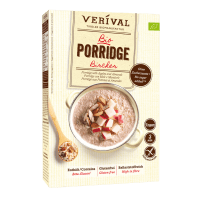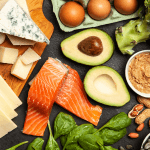6 different nutrition types and their history
September 9, 2019- Breakfast
- Nutrition

Nutrition is probably one of the most discussed topics in the history of mankind. What we feed our body is extremely crucial for our physical and mental health. Of course, there are different prejudices for all the different nutrition types. But not only for the sake of one’s own body or health, do many choose an alternative type of nutrition. Recently, there have been more and more climate or animal ethical concerns about consuming meat on an everyday basis. Which nutrition types can be distinguished and what effects do they have on the body? In the following, we will introduce some of the different nutrition types to you.
Omnivore:
We will only mention this category briefly, as it is probably the easiest to explain. Omnivores basically eat everything. Apart from personal preferences and tastes, they do not limit themselves at all and consume both animal as well as vegetable products.
Vegetarian:
Vegetarianism is probably the classic among all the different nutrition types. The oldest alternative to the classic omnivore diet has its origins in ancient times. Initially, two meatless forms of nutrition developed independently of each other in the Greek culture and in India. In recent studies, however, no consistent form of vegetarianism has been found in these cultures. However, one of the results of the research was that there was already a low meat diet in ancient Egypt – although there were enough cattle and fish available, the majority of food was vegetables and cereals. Vegetarianism means consuming only plant products and products from live animals. Products from live animals such as eggs, cheese and co. are therefore perfectly okay. Studies have shown that vegetarians have a lower mortality rate than omnivores.
Pescetarian:
Pescetarism, as the name suggests, is a variation of vegetarianism. Pescetarians do not eat meat, but fish (from “piscis” = Latin for “fish”). Pescetarians are primarily concerned with a healthy diet, which they try to round off with fish products. The English “Vegetarian Society”, the first association from vegetarians for vegetarians, founded in 1847, clearly states that eating fish products is not compatible with a vegetarian diet and basic vegetarian ethics. Pescetarians in general eat fish, some also eat other seafood such as crustaceans and molluscs, although opinions clearly divide on this topic. The advantages of a pescetarian diet are that the additional consumption of fish provides valuable proteins, omega-3 fatty acids and amino acids, which are easier to process than the plant-based alternatives. However, the disadvantages are the existing overfishing of many species and the fact that fish are often polluted with environmental toxins, which can also have an effect on human health.
Flexitarian:
Flexitarianism describes a food culture that includes meat but does not focus on meat consumption. Flexitarians try to exclude meat but may have meat if they feel like having it. They pay a lot of attention to animal welfare and the quality of the meat. Here the motivation usually is health related. The proportion of flexitarians is higher in older households than in younger ones. Also an animal ethical component plays a role for flexitarians. Flexitarians usually advocate species-appropriate animal husbandry and want to be a countermovement to cheap meat consumption. According to studies, flexitarians generally live healthier lives. Overall, this group eats less meat, which leads to a more conscious, healthier lifestyle. Various doctors claim that a flexitarian lifestyle would be exactly “the right” diet, as there is no threat of a shortage of certain substances. There is also a lower risk of heart diseases and diabetes.
Vegan:
At present, veganism is probably the most widely known alternative form of nutrition besides vegetarianism. This type of diet is both controversial but also much loved by many. Hardly any other topic makes friends become strangers so quickly and strangers become best friends. To live vegan does not only mean to eat absolutely no products that come from animal production, but it is rather an attitude to life as well as a task. Vegans are confronted almost daily with prejudices and all kinds of opinions. It is now well known that a vegan diet with the necessary prudence and basic knowledge concerning nutrition is possible without getting any deficits in nutrients. However, many doctors still advise against a vegan diet in some phases of life, such as pregnancy, breastfeeding and during growth.
At Verival, we offer an extensive range of vegan products. You can browse through our offer of vegan products here!
Fruitarian:
Fruitarianism is a so to speak “radical” fringe group of veganism. This diet consists only of fruits. It is important that the plants are not damaged during the harvest. Therefore, many representatives of this diet only eat fruits or nuts that already have fallen from the tree. The different rules of this very special nutrition type are however quite controversial. Some fruitarians, for example, eat honey, others completely exclude it. There are no exact rules concerning fruitarianism. However, nutritionists are of the opinion that someone who only eats fruit is more likely to suffer from deficiency of nutrients. For example, there is usually a lack of proteins, vitamins, calcium, zinc, iron and iodine. Doctors and nutritionists therefore agree that this type of diet should be treated with caution.
In conclusion, no matter which alternative diet you choose or would like to try, it is advisable to consult a doctor beforehand. Regular blood tests provide you with information on whether the body has everything it needs or whether something is missing.
As producers of organic food, we find the discussion about different types of nutrition very important, especially with regard to climate change. Even small changes in consumer behaviour can have a big impact if enough people join forces.
- #flexitarian
- #fruitarian
- #nutrition types
- #omnivore
- #pescetarian
- #vegan
- #vegan
- #vegetarian












